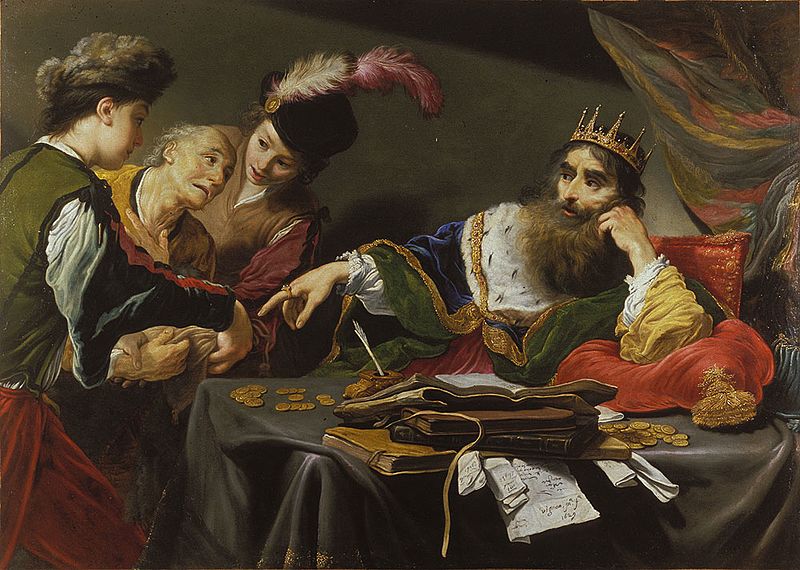21 Then Peter came and said to him, “Lord, if another member of the church sins against me, how often should I forgive? As many as seven times?” 22 Jesus said to him, “Not seven times, but, I tell you, seventy-seven times. [Matthew 18:21-22, NRSV]
Parable of the Unforgiving Servant, by Claude Vignon 1629.
The Parable of the Unforgiving Servant was told by Jesus in answer to Peter’s question about forgiveness. Peter wanted the Lord to confirm for him how many times he needed to forgive someone who had trespassed against him. Peter had asked Jesus how many times he should forgive, mistakenly thinking that seven times would be overly generous, and missing the point. This is a parable that links several key theological points concerning God’s dealings with humanity.
- Peter’s vision is “when” – when does it become alright to retaliate. Saying seventy-seven times, Jesus recalled Lamech’s boast in Genesis 4:23-24: “I have killed a man for wounding me, a young man for striking me. If Cain is avenged sevenfold, truly Lamech seventy-sevenfold.” Jesus does not respond to Peter’s “when”; he stresses the “where”. Wherever forgiveness is lacking, measured response escalates to revenge, like a murder for a slap. The opposite of forgiveness, Jesus teaches, is increasing violence. Forgiveness, therefore, is compulsory from the human side in order for the kingdom of God to be present on earth as it is in heaven.
- Then, the effectiveness of God’s forgiveness to sinners, even though freely given by God, is conditional upon the forgiven-sinner being forgiving towards others. If he does not forgive others, he denies himself of the efficacy of God’s forgiveness to him. “Seventy-seven times” symbolizes unrelenting commitment to forgive others’ bad treatment of you. So the Lord taught us to pray in the “Our Father”: “Forgive us our trespasses as we forgive those who trespass against us.”
- The parable also stresses 2 opposites. First, at the vertical dimension between God and humans, the debt we as sinners owe to God is so huge that it is impossible for us to pay, so that the only way for peace between God and humans is for God to forgive – to write-off – our debts. Second, by comparison, at the human horizontal dimension, the debts others owe us are so infinitesimal that God desires to see us forgive them.
- The flow of compassion and mercy in the king signifies the essence of God. God is mercy. In his teachings and actions, Jesus presents us the human face of God. Jesus desires to see mercy in human interaction, the episode of the woman caught in adultery narrated in John 8 being a graphic demonstration of this. And so, to the unforgiving servant in the parable, the king said: “You wicked slave! I forgave you all that debt because you pleaded with me. Should you not have had mercy on your fellow slave, as I had mercy on you?” That explains why Pope Francis insists that a merciful God wants to see a merciful Church.
- In this parable, Jesus exposes our blindness. He wants us to see ourselves in the unforgiving servant. Where Christian followers do not see themselves making desperate pleas with God for mercy and forgiveness, we cannot “hear” our very same words when these are uttered by others to us: “Please have patience with me. Please forgive me. Please have mercy on me…” Then, we who are forgiven sinners, cannot in turn love our neighbours.
- Finally, this parable teaches that forgiveness stands at the origin of a new life, a life of authentic freedom. Negative experiences of sin – our own and others’ – claim us as they influence and dominate us long after the actual offense had ended. Once they get a foothold in our hearts and minds, they constrict our freedom. They imprison us in bondage and, in turn we imprison others in bondage. Forgiveness frees us from this prison and bondage and releases us to a new life.
Copyright © Dr. Jeffrey & Angie Goh, July 2022. All rights reserved.
You are most welcome to respond to this post. Email your comments to jeffangiegoh@gmail.com. You can also be dialogue partners in this Ephphatha Coffee-Corner Ministry by sending us questions for discussion.

